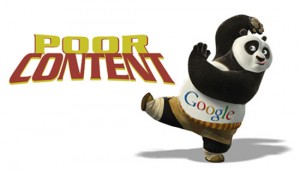Post Panda, many Search Engine Optimization (SEO) professionals have been left to wonder what types of SEO strategies were punished, and what types were rewarded ever since the highly discussed "Google Panda Update" has taken form.
I recently sat in on a webinar attended by loads of professional affiliate marketers. The presenter was a sharp affiliate and SEO superstar named Dustin Bow, presenting on behalf of Offer Vault (a well known directory of online advertisers and offers).
I had my hand note taking program open so I could type up some notes and this is what I took away from the webinar, along with some of my own opinions thrown in for good measure of course...
The main purpose of this update was similar to many of Google's past updates: To reward high quality content and penalize websites with low quality content, such as content farms for example.
Websites that borrow or steal content from others (also known as borrowed content, scraped content, raked content, etc) by way of RSS feeds, their own robots, or lots of trackback URL's were a ticking time bomb in Google's eyes. This panda update just allowed Google to accurately lift the cross hairs on target and pull the trigger.
Many websites were de-indexed completely as a result of this update. If your site was among them, you may be actually better off counting your losses and starting over versus trying to salvage a de-indexed web property.
A simple way to see if your site was affected by the update is to run reports and compare traffic data between the following two periods:
-
- February 23, 2011 - February 28, 2011
- February 16, 2011 - February 21, 2011
When comparing traffic data between these two periods ignore statistics relating to keywords unique to your particular brand or company name. Also take into account what if any of your traffic may have come from paid search advertising such as AdWords, AdCenter, etc.
So What Can We Do To Improve Our Website's Optimization for Organic Search Results, Avoid Future Penalties or Demotions, and Become All Around Cooler Internet Marketers?
First off, when it comes to off-site SEO consider the source of your links. EzineArticles.com was one of the hardest hit websites which may have something to do with the waning efforts to accept only high quality articles. Try to get inbound links from websites closely related to your niche or topic. If you write great content people will want to link to your website.
Secondly, when you begin to consider on-site SEO strategies keep in mind the main gist of the Panda update. Google made it clear and once again screamed to the world: "We Don't Like Duplicate Content!"
Think of things you can do to try and decrease the amount of duplicate content on your own website. Whether or not you realize it there is most likely at least a little bit of duplicate content hiding beneath the surface on your website, especially if you're using WordPress...
I'm going to be focusing my efforts on ensuring that the meta-data across my pages varies accordingly. WordPress users will see the value in plugins like Headspace, which allow you to have custom page titles, and meta descriptions on each post and page.
If you're using a generic SEO plugin that stuffs the same meta-data onto every page think seriously about finding a quick remedy for that issue. You don't want numerous pages, or worse yet, all of your pages containing the same meta titles, keywords, and descriptions. Are you beginning to see what I mean by in-house duplicate content?
WordPress tag pages are another example of a near-useless page that stuffs the same keywords over and over onto a web page with very little meaning to human readers. Spiders aren't human, but sometimes you have to remind them by using a "no-follow" in your Robots.txt file :).
Also being more selective about who you share your link juice with may become a more important factor in the future.
Avoid WordPress plugins that add duplicate content across many pages. They're not as helpful as they may seem.
A few additional suggestions from both Dustin's presentation and my own observations would be:
-
- Limit links from places where they're easy to obtain (like article directories)
- Re-write any poorly written content as soon as possible (especially if you have content written by writers who use English as a second language)
- Be unique, original, write well, and offer up a lot of value
- Engage your readers with images, illustrations, and tables
Anything that increases stick rates, lowers bounce rates, and brings in targeted traffic will not only help you find the type of visitors your website was built for, but also help you fare better in the search engines now, and after future updates.
Wordpress and SEO goes together very well. You may also want to check out this In-Depth SEO Guide for higher rankings from one of our overseas counterparts that I found to be helpful and easy to implement for "do-it-yourself'ers."




